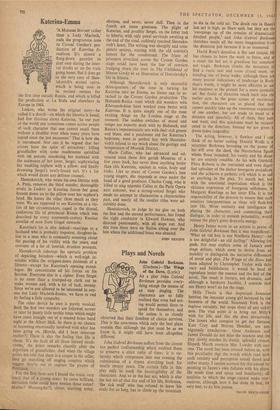Plays and Novels
John Gabriel Borkman.
(Duchess.)—The Wings
John Gabriel Borkman suffers from the almost too perfect craftsmanship which enabled Ibsen to preserve a strict unity of time: it is vir- tuosity which compresses into one evening the culmination of a drama stretching back for nearly twenty years. The curtain falls in this play only to mark the incorrigibility of the characters. And so in the last act, which is also the last act of that day and of his life, Borkman, 'the sick wolf' who has refused to leave his study for so long, has to climb up the mountain
to die in the cold air. The death rate in Ibsen's last act is high, as Shaw said, but they are the 'sweepings up of the remains of dramatically finished people,' and John Gabriel Borkman therefore needs all the more imagination from the direction just because it is so mannered.
David Ross's direction is flat and insipid. He
has chosen to leave the work to Ibsen, and as a result the last act is grandiose but somehow not tragic. Borkman climbs the mountain to find a rustic seat and some crystal snow, re- minding one of Swiss walks; although there aro many precise indications of landscape in Bork' man's words, it might be more effective to use his madness as the pretext for a more symbolic set. But faults of direction reach back into the earlier acts. In the great scenes of recrimina- tion, the characters are so placed that they cannot quickly take up the venomous exposition of one another, but are made to stand at a distance and speechify. All of them, they hate and want, and this quickness must be recipro- cated in the direction. Instead we are given a doom-laden languidity.
The acting, however, is flawless and I can
think of no better casting. Donald Wolfit is a saturnine Borkman brooding on the power of his will over the deed, the Nietzschean figure whom Ibsen intended; his vanity and his disas- ter are entirely credible. As his wife Gunhild, Flora Robson is the restrained and even digni- fied upholder of the darker bourgeois prejudices, and she achieves a pathetic evil which is as sad as anything in the play. To match her, but with the emotional imperialism which is the ultimate expression of bourgeois selfishness, is Margaret Rawlings as her sister Ella. It is the responsibility of the director to ensure that such sensitive interpretations as these will flash-fire into life. More intensity and intelligence in placing the characters and connecting their dialogue, in order to enmesh personality, would release the play's great dramatic energy.
Henry James wrote to an actress in praise of John Gabriel Borkman that it was magnificent: 'What an old boy is our Northern Henry!—he is too delightful—an old darling!' Allowing for gush, this may explain some of James's own stage defeats, which seem to derive from an inability to distinguish the narrative differences of novel and play. The Wings of the Dove has been adapted by Christopher Taylor with deli- cacy and faithfulness; it would be hard to reproduce better the essence and the feel of the novel. The result is literary, not dramatic, and although a hardcore Jacobite, I concede that our Henry won't do for the stage.
Milly Theale is that important Jamesian
heroine, the innocent young girl betrayed by the baseness of the world. Susannah York is the ingenue certainly, but stops short of any sickli- ness. The vital point is to bring out Milly's wish for life, and this she does attractively. The lovers who conspire to get her fortune, Kate Croy and Merton Densher, are am- biguously treacherous: Gene Anderson and James Donald do not miss the nuances and the play slowly reaches its stately, splendid climax. Elspeth March overacts Mrs. Lowder with suc- cess. The novel has been created before us, with this peculiarity t4t the words which read with such subtlety and perception sound dated and rather muzzy. I cannot account for this except by pointing to James's own failures with his plays. He needs time and space and familiarity, all qualities to which the stage cannot make con- cessions, although here it has done its best, its very best, to do him justice.






































 Previous page
Previous page